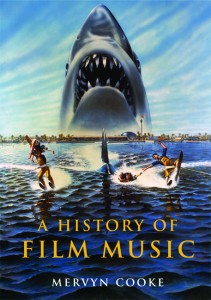A History of Film Music by Mervyn Cooke (Cambridge University Press, 2008), 584 pages, ISBN: 978-0521010481 (paperback), £17.99
 About the reviewer: Dr Kevin Donnelly is Reader in Film at University of Southampton. His publications include: Film Music (Continuum, 2001); Pop Music in British Cinema: A Chronicle (BFI, 2002); The Spectre of Sound: Music in Film and Television (BFI, 2005); with Jamie Sexton, Music, Sound and Multimedia: From the Live to the Virtual (Edinburgh University Press, 2007); edited with Philip Hayward, Music in Science Fiction Television: tuned to the future (Routledge, 2013); Occult Aesthetics: synchronization in sound film (Oxford University Press, 2014)
About the reviewer: Dr Kevin Donnelly is Reader in Film at University of Southampton. His publications include: Film Music (Continuum, 2001); Pop Music in British Cinema: A Chronicle (BFI, 2002); The Spectre of Sound: Music in Film and Television (BFI, 2005); with Jamie Sexton, Music, Sound and Multimedia: From the Live to the Virtual (Edinburgh University Press, 2007); edited with Philip Hayward, Music in Science Fiction Television: tuned to the future (Routledge, 2013); Occult Aesthetics: synchronization in sound film (Oxford University Press, 2014)
They say never to judge a book by its cover, and I’ve often been disappointed by books with great covers. A History of Film Music has a cover I really didn’t like. It is derived from the poster for Jaws 3–D (1983), which is not a terribly engaging image in itself, but also suggests an oblique connection with an iconic piece of music: John Williams’s theme for the shark in that series of films. This connection between the image and film music is not instantly apparent, at least not as much as the rear cover still from Gold Diggers of 1933. However, that image is deceptive as the book contains no detailing of film musicals or their music at all, being concerned essentially with film scores, or incidental music
 Writing on film music has grown massively recently, after decades of neglect by both film studies and music studies. Only a few years ago, there were just a handful of books concerned with film music, but these days we seem in danger of an inundation. This is no bad thing. University music departments are taking film music more seriously than ever and it is on the agenda far more in film studies programmes, even if we are still beset with the continued (and ludicrously erroneous) use of the term 'visual culture'.
Writing on film music has grown massively recently, after decades of neglect by both film studies and music studies. Only a few years ago, there were just a handful of books concerned with film music, but these days we seem in danger of an inundation. This is no bad thing. University music departments are taking film music more seriously than ever and it is on the agenda far more in film studies programmes, even if we are still beset with the continued (and ludicrously erroneous) use of the term 'visual culture'.
One type of book that has been conspicuously lacking is the wide-ranging historical consideration. Apart from Russell Lack's non-academic and sporadic Twenty Four Frames Under (Quartet Books, 1997), and Paul Tonks' 'bluffer's guide' style volume in the ‘Pocket Essentials’ series from 2001, we have been without a dedicated and scholarly history. Mervyn Cooke has produced the first English-language book dedicated to the historical development of incidental music for films, and it is an extremely readable and significant addition to current literature.
The book tends not to be composer-based, although its detailing of the 'Golden Age' concentrates on a number of key classical Hollywood composers. Instead, A History of Film Music mixes an interest in composers with a focus on film genres, film movements, the work of key directors and broad historical developments in the film music industry. By and large, these are the 'consensus' main points to cover in most general books on film history, and it is perhaps surprising that a 'musical' take would not be too far removed. The book includes both mainstream and art cinema, both Hollywood and other cinemas, including small sections on India and Japan, as well as dealing with Britain and France in more detail (each receives a chapter).
A History of Film Music is also a worthy academic contribution, with the sort of detail and coverage that authoritative review histories require, with the possibility of being used as something of a reference work for wider vistas and deeper backgrounds than are available in other writings.. It is a substantial and well-researched piece of work that will doubtless remain a staple course book for years. While its wide coverage is a strength, its absences are its weakness, with popular music and film being relegated to a single chapter (twenty-six pages out of 510), while ‘electronics, sound technology and recording’ receives only seven pages. Surely in both cases they required more. That said, this is nevertheless a welcome and substantial addition to the growing body of strong literature about music and cinema.
Dr.K.J.Donnelly